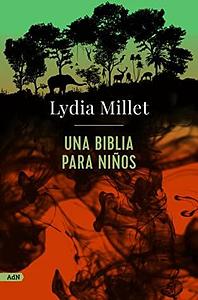Take a photo of a barcode or cover
The parents comment on the injustices of the world, but what are they really doing to make a better world? The youths spot this as the greatest injustice because it covers everything. The parents don't see climate change as their fault because what could they have done? The kids see climate change as absolutely as their fault because who else could have done something?
The biblical parallels are a fun and curious momentum, to bring home the scale of destruction and how we're talking about potential collapse and extinction, not just bad policies to argue over. The world can change for the worse quicker than you think. Building a better one takes time, sure, but it at least takes something.
The dialogue is so casual that it almost reads apathetic, and there may be some truth to that. The kids know they don't want to be their parents, especially after they biffed planning for a society-shifting hurricane, but they aren't necessarily sure what their utopia would look like. And that's part of it. You want to believe the kids will figure it out before adulthood. But who's to say the parents didn't want the same thing when they were young?
It's a lively commentary on generation gaps without really getting too far into the weeds. You get who's who in their dual-level of hierarchy, and you know what you want for the world around them—oftentimes it's because it's what you want from ours. Every generation blames the generation before. What matters is that every generation doesn't scoff at the generation that comes after.
i read this as it is it was the bookstore i work at featured book of the month, i dont think i would have picked this up on my own volition. dystopian is not my preferred genre but i do think this short book had a lot to say about absent parents, the current climate crisis, religion and just overall children.
i didn’t love the ambiguous nature of the apocalypse and i really did want to know more about what was happening outside of these kids bubble. it is clearly supposed to be surreal and just focus on the kids as an collective but like i needed to know what was happening.
That said, the allegory at the center of the story ultimately rang hollow to me. The narrator Eve's 9-year-old brother Jack is given a children's Bible and begins to notice similarities between the Bible stories and the characters' current situation. This leads him to develop a theory that the Trinity are symbols: God is nature, and Jesus is science, since he will only save you if you believe in him. (Late in the novel, Eve finishes this alternate trinity by suggesting that
Spoiler
the Holy Spirit is artThis is in-character for a bright 9-year-old who's had no religious education, but the novel itself never really develops Jack's childish analogy into anything more mature or nuanced - the final page hammers it home with zero subtlety. So we're left with the equivalent of the yard sign that probably stands in front of all these character's homes: "In this house we believe in science." But belief in science doesn't protect against the greed and inequality that led to the crisis in the first place, and it doesn't create the altruism or love or sense of meaning needed to survive it. (It's notable that Mattie, the
Spoiler
Christ figureAlso, a warning: If you're sensitive to torture scenes, there are a couple of nasty ones that occur while the kids are staying on the farm, though it's pretty obvious when they're about to happen if you want to skip ahead.





